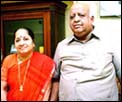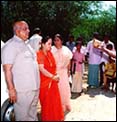
The Rediff Special/Shobha Warrier
Al Seshan!
 On Monday, T N Seshan takes on K R Narayanan in the election for the President of India. Shobha Warrier, who met him recently for an interview for Rediff On The NeT, recalls his encounter with the fiery mandarin-turned-Messiah.
On Monday, T N Seshan takes on K R Narayanan in the election for the President of India. Shobha Warrier, who met him recently for an interview for Rediff On The NeT, recalls his encounter with the fiery mandarin-turned-Messiah.
It is only an hour's drive from Madras to Sriperumbudur, but the
National Highway is in bad shape. Last year's north-east
monsoon had created havoc on almost every road in the east coast
area. More than six months have passed, but the roads still look
patched up. It was not exactly a pleasure to drive along the bumpy
road in our jalopy.
Also, we encountered umpteen cyclists, overcrowded buses driving
menacingly and, of course, speeding taxis. Everybody was in a
hurry to reach their offices, schools and factories. We, too,
were in a hurry; our appointment was at nine in the morning.
Once inside the village, though, the transformation was dramatic.
We could not see anyone walking or moving around hastily. All
of them were rather indolent and seemed to enjoy the leisurely
pace of life. Even the cows, buffaloes and goats looked serene
and peaceful. Men crowded in front of tea shops, perhaps gossiping
about Rajnikanth's latest film or the inevitable friction between
the TMC and the DMK.
The moment our car stopped, they got up from their cozy seats
and came near us enquiringly. Yes, they were more willing than
to guide us to the place where former chief election commissioner
T N Seshan lived.
"You take a left turn, go straight, then take a right and
soon you can see an Amman Koil. Don't turn there, go ahead, straight
ahead. No, you will not miss the route. After all, it is a small
village, Amma. If Seshan is there, you will be can see the police
cars from afar itself," our good samaritan told us enthusiastically.
"No, he is not there. Yesterday, I passed by the ashram but
didn't see any police cars there. He is not here, Madam,"
another person butted in.
Naturally, this infuriated the first person, "Who told you
he is not there? Today morning, when I came cycling, I saw several
police cars parked in front. Yes, he is there. Amma, you following
my instructions and you will reach the ashram without any problem."
"No, I didn't see any cars yesterday."
"That was yesterday, not today."
We left them fighting over Seshan's presence.
 The first person who had come cycling to the tea shop in the morning
was right. We could see a number of cars parked in a row on one
side of the road. As we reached nearer, the black cat commandos
seated inside the cars glared at us as if we were there to bomb the
place.
The first person who had come cycling to the tea shop in the morning
was right. We could see a number of cars parked in a row on one
side of the road. As we reached nearer, the black cat commandos
seated inside the cars glared at us as if we were there to bomb the
place.
We were stopped near the gate. Explanations to the fact that we
were here to see T N Seshan had no effect; we were politely asked
to wait. "We came to see Krishna Kumar (the managing director
of the Arya Vaidya Pharmacy, Coimbatore, who runs the ashram),"
I said. The transformation was unbelievable. We were ushered in
royally.
Gokul Dham does not look like a conventional ashram, especially
with the gun-toting soldiers standing outside, but it was tranquil
and there were flowers and greenery all around.
We were early for our appointment, but were taken
to Seshan's room immediately. Seshan looked at us with a grim
expression, but his wife, a very sweet lady, smiled at us. The
introductions were promptly performed and a formal "Good
Morning" indicated that he was ready for the interview.
His countenance and appearance were intimidating but, in reality,
he was not as fearsome as perceived. He has mellowed down a lot.
Though he was very serious and withdrawn with me, he was very
informal and friendly with my son (who bunked school and came
with me to Sriperumbudur to see Seshan) and constantly
cracked jokes and quizzed him.
Once the interview started, Seshan was quite open and spoke without
any inhibition. Though I was supposed to be asking him questions,
he reversed the role several times, much to my discomfort.
Contrary to the general belief, Seshan has not shifted his base
to the ashram. He shuttles between Delhi, Madras, Sriperumbudur
and many others places. "I don't consider any place as an
absolute base or camp. Life itself is a big camp. Sometimes I
am in the Delhi camp, sometimes I am in the Madras camp, sometimes
I am in the Sriperumbudur camp. I find this ashram a much better
place to reflect in than Delhi."
The Kshethropasan Trust, of which Seshan is a member, also runs
old age homes, schools, an Ayurveda hospital, and a mobile dispensary.
It has even adopted a village and is in the process of
rebuilding the thatched huts and providing a regular source of
water.
Before we commenced the interview, Seshan said, "We are going
to the village at 10.30. The first house is ready. So, there is
a function there." He was going to hand over the keys of
the house to the young owner.
At ten thirty, he left. Naturally, so did we. The first car sped
away with the Seshans, followed by several cars, all full of armed
commandos. What amused me was the way the commandos jumped into
the moving car. They would wait outside till the car started moving
before jumping into the car, clutching onto the door first, then
sliding in like some reptiles.
 Our first stop was at another small ashram with temples, lots
of trees, greenery and flowers all around. As soon as the first
car carrying Seshan stopped, the other vehicles also screeched
to a halt. The commandos jumped out even before the vehicles even
stopped. To tell you the truth, their magnificent feat was my
highlight of the trip.
Our first stop was at another small ashram with temples, lots
of trees, greenery and flowers all around. As soon as the first
car carrying Seshan stopped, the other vehicles also screeched
to a halt. The commandos jumped out even before the vehicles even
stopped. To tell you the truth, their magnificent feat was my
highlight of the trip.
Seshan, his wife and Krishna Kumar walked fast, so did the commandos.
Some of them had to follow him to the temple too, so they removed
their shoes in a hurry. The acrobatics were repeated as the cars
fled to their next destination. We found it difficult to keep
pace with them in our jalopy. There were no pucca roads
to the village, the few that were there were laid by the Trust.
The convoy of vehicles moved fast, raising a lot of red dust.
Finally, we decided to slow down.
A huge crowd was waiting for Seshan near the village. They knew
who he was and what he did during his tenure as the chief election
commissioner. "Ayya is helping us now," they
said. After the usual rituals like breaking the coconut, performing
an arti and blessing everyone, the Seshans went inside
the house to hand over the key to the bewildered young man.
A special pandal had been built for the next function.
Men and women of all ages and sizes had assembled there to receive
bed sheets, bed covers and blankets, donated by some kind-hearted
north Indian. Seshan's wife distributed the sheets, asking kind
things of everyone. Meanwhile, Seshan enlightened them, "Do
you know where north India is? Somebody from there has sent you
all this."
Function over, all of them scrambled back to the cars. It was
like watching a movie on fast forward. But Seshan was an energetic
man in a hurry. Ensconced once again in his room at Gokul Dham,
he continue with the interview. Only to issue a stern warning
at five minutes to 12.30. "I give you five minutes to finish
the interview."
 Krishna Kumar had selected cooks from Kerala for the
ashram's kitchen. As a result, we were served a delicious Keralite
meal. Seshan and his wife had lunch on plantain leaves, we used
steel plates. Seshan was silent as he ate. After he had finished his lunch, Krishna Kumar commented,
"You can photograph Seshanji's plantain leaf. It will
look as if it was not used before. Nothing will be left on the
leaf except drum sticks."
Krishna Kumar had selected cooks from Kerala for the
ashram's kitchen. As a result, we were served a delicious Keralite
meal. Seshan and his wife had lunch on plantain leaves, we used
steel plates. Seshan was silent as he ate. After he had finished his lunch, Krishna Kumar commented,
"You can photograph Seshanji's plantain leaf. It will
look as if it was not used before. Nothing will be left on the
leaf except drum sticks."
"He always says that if somebody offered him millions of
rupees, he would eat them too," his wife joked. Everyone
laughed except, of course, Seshan. We left the ashram with Seshan's
"God bless you" ringing in our ears.
Photographs: Sanjay Ghosh
Tell us what you think of this report
|





